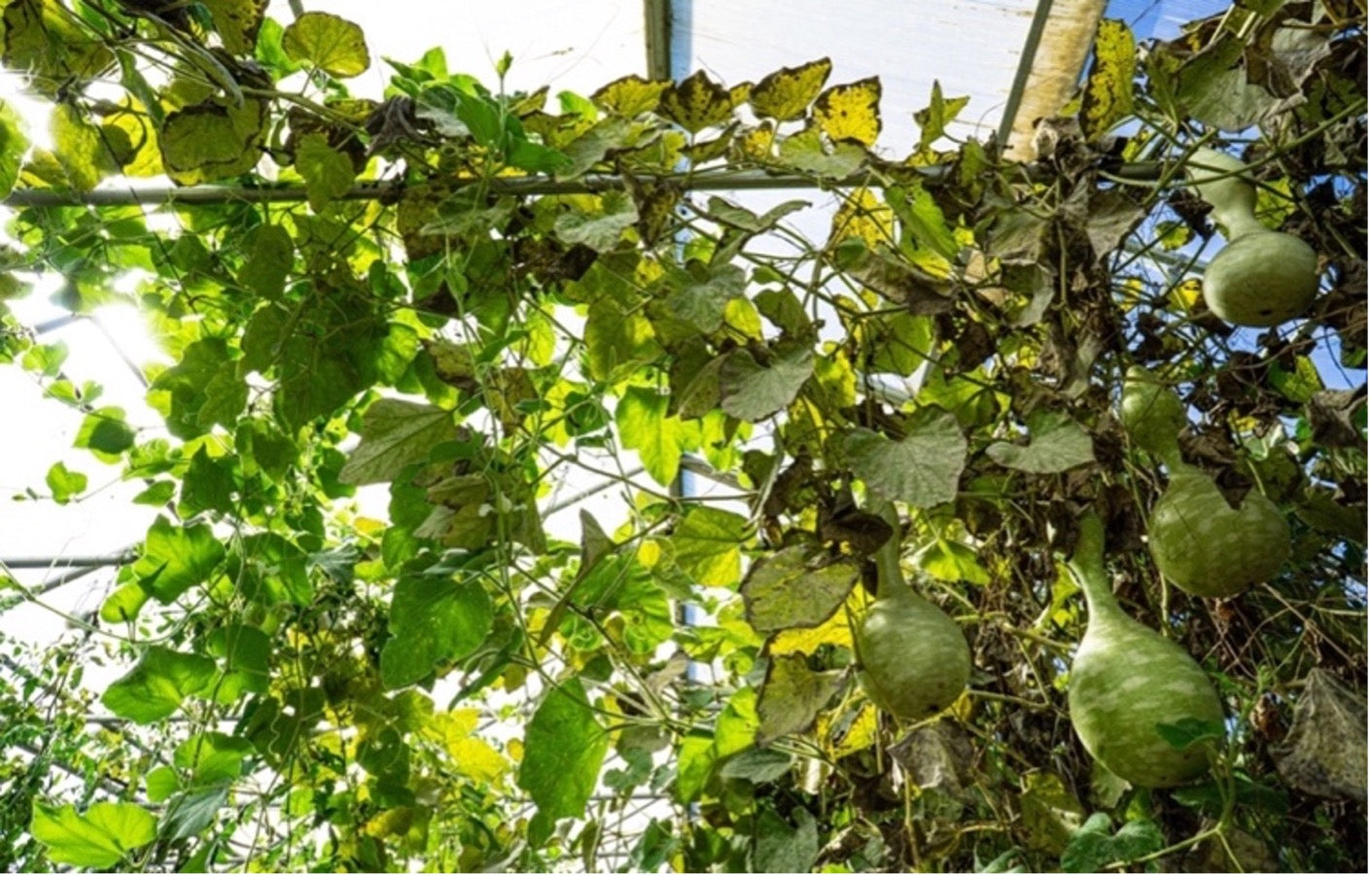Below is a list of regenerative, organic, and biodynamic farms that have received some form of contractual aid or financial assistance from the Peconic Land Trust - an institution aimed at conserving natural and agricultural landscapes for public and private use and community benefits.
The East End Community Organic Farm (EECO) (https://www.eecofarm.org)
This 42-acre plot is owned by the town of East Hampton, but the development rights have been leased to EECO Farm. This farm provides access for beginning farmers and gardeners to grow fresh produce in 120 twenty-by-twenty-feet community gardens that can be rented seasonally by local communities, groups, and/or individuals. Over five acres on this farm are dedicated toward composting, a practice which provides nutrient-dense material, thus improving soil health and ultimately the nutritional quality of produce harvested later on and consumed by local communities. See picture on front page for huge gourds!
Wickham’s Fruit Farm
This fruit farm produces a wide variety of fresh produce that customers can purchase at the farm stand or pick directly from the source via a ‘U-Pick’ program. Seasonal produce includes numerous varieties of apples, melons, strawberries, blueberries, raspberries, peaches, nectarines, pears, asparagus, tomatoes, and pumpkins. Most apple trees on this farm are grafted at an early age through a process called dwarfing, which results in a higher rate of production based on innovative genetic modification. This farm also sells home-made apple cider donuts, fruit-pies, and freshly baked goods in their store.
8 Hands Farm (https://www.8handsfarm.com)
This 28-acre farm produces organic produce and pasture-raised meat has demonstrated a strong commitment to restoring and enhancing the quality of the natural environment, plus is located in Cutchogue, New York. The farm employs organic principles and raises sheep, goats, pigs and chickens until they are ready to be harvested for consumption. Customers are welcome to visit the farm store and butcher shop or have an outdoor meal at the 8 Hands Food Truck - located on-site with a rotating, seasonal menu. This farm definitely has been embracing the concept of farm-to-table by providing Michelin-level cuts and stuffs of meat to at-home and local kitchen tables.

Above: Lone Sheep Grazing at 8 Hands Farm (2019)
Sang Lee Farms (https://www.sangleefarms.com)
This produce farm has a CSA with over 700 members – one of the largest certified-organic farms on Long Island. Although becoming certified-organic can take up to three years and requires a host of application fees and additional expenses for certified-organic inputs, Owner Fred Lee claims the certification adds credibility to his business and helps establish trust with his customers. For this reason, Sang Lee Farms complies with inspections from the USDA and FDA to ensure that expectations for organic agricultural operations are being precisely met. This farm also supplies farmers markets in NYC with fresh, organic produce (near Dumbo, Crown Heights, and Brooklyn Bridge) to urban communities often with limited outlets for healthy and nutritious fruits and vegetables.
Feisty Acres (https://feistyacres.com)
This small farm raises heritage breeds of game and poultry (Japanese quail, guinea fowl, silkie chicken, partridge, turkey, and ducks) which are sold through a CSA program as well as multiple farmers markets across New York City - including the Greenmarkets at Union Square and Brooklyn Army Plaza. Most heritage breeds have been selected based upon genetic characteristics that demonstrate regional resilience. The animals are raised outdoors in rotating enclosed pastures until reaching full development, size, and maturity. This farm has found a way to embrace a niche market, and the co-owners (Abra and Chris) perform soil tests at least once per year to carefully monitor the living conditions for the animals and ensure that good food products are reaching consumers.

Above: Heritage Turkeys Gobbling in Sync at Feisty Acres (2019)
Sylvester Manor Educational Farm (https://www.sylvestermanor.org)
This productive farm is also a non-profit organization that is dedicated to improving sustainable agricultural production and providing environmental education. Once a slave-holding plantation, this area has been contemporarily transformed into an ecological farmstead that cultivates plants and raises animals. Sylvester Manor also hosts seasonal events open for the public to attend - including farm-to-table dinners, foraging classes, theatrical acts, and live musical performances. This farm offers a 7-month apprenticeship program with provided on-farm housing for workers and volunteers, granting an excellent beginner experience in agriculture. Moreover, this farm also demonstrates its commitment to the regional community through a 120-member CSA program and leases out small plots of land for others to grow fresh produce and raise livestock for commercial sale.

Above: Red-Angus Cow Grazing after Rotating Pasture at
Sylvester Manor Educational Farm (2019)
Southold Bay Oysters (https://www.southoldbayoysters.com)
Southold Bay Oysters Preserve is a shell-fish farm that grows and cultivates Shindig Oysters in the Peconic Bay. The owners use a series of tanks, harbored cages, and protected reefs to foster a healthy, secure, and nutrient-rich environment for their oysters to thrive in until reaching full maturity before harvest. This process begins by raising oysters in a hatchery and continues until the oysters develop a hard shell during a stage called metamorphosis. From this point on, oysters are removed from their holding tanks and transplanted into Southold Bay - where they develop their natural brine and flavor profile based on the local merroir. One fun fact: oysters can filter up to 50 gallons of water per day (which is beneficial for the natural environment), and this farm often sells up to 20k-30k oysters per year (which is beneficial to the local economy)!

Above: Raw Southold Bay Oysters on Ice with Accompaniments (2019)





0 comments